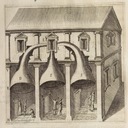27C3 - Version 1.6.3
27th Chaos Communication Congress
We come in peace
| Speakers | |
|---|---|
|
|
Oona Leganovic |
| Schedule | |
|---|---|
| Day | Day 2 - 2010-12-28 |
| Room | Saal 3 |
| Start time | 16:00 |
| Duration | 01:00 |
| Info | |
| ID | 4144 |
| Event type | Lecture |
| Track | Society |
| Language used for presentation | English |
| Feedback | |
|---|---|
|
Did you attend this event? Give Feedback |
A short political history of acoustics
For whom, and to do what, the science of sound was developed in the 17th century

The birth of the modern science of acoustics was directly intertwined with the desires to surveill and communicate, either in secret or to everybody at once. Acoustics was not just about 'learning more about nature,' right from the start it was an applied science, driven by very clear notions of who has the right, and thus should have the possibility, of listening in on others, who needs to be able to converse in private, and who should be heard by everybody if he wishes to. How are these historical ideas related to those of today?
The talk teases out these juicy implications from mostly original source material, focussing on the strange figure of the Jesuit Athanasius Kircher, but also looking at better known characters of the Scientific Revolution like Francis Bacon, Marin Mersenne, and the early Royal Society. There are plenty of phantastic 'scientific' illustrations to look at as well as descriptions of devices (for the amplification of sound, for acoustical surveillance, entertainment, and the so called 'cryptoacoustics') that did or rather did not work to laugh about, but the key questions are those about power and its relationship to notions of privacy and communication, the history of privacy as a privilege and surveillance as a 'right' of government. Some of these ideas become especially clear in the phantasies they produced. How are these historical ideas related to our own about who gets to listen in, who gets to converse in private, and who get to be heard by everybody? And what has all that to do with the history of science, and even magic?
